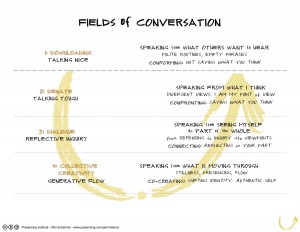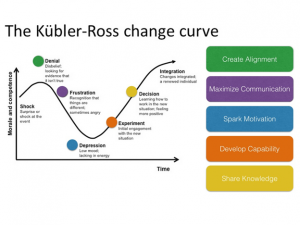Tag Archives: participatory
Jul
10 post-referendum coping strategies
By coincidence, a couple of weeks ago, I was researching the concept of “othering” – “to view or treat (a person or group of people) as intrinsically different from and alien to oneself”. The evolution of this concept can be traced through a number of philosophers, sociologists and pyschologists, from Hegel, through De Beauvoir, and on through Lacan, Levi-Strauss, Said, Rorty….and a search for “referendum” and “othering” shows a surge in its use. I had only been delving into the term as part of my reaction to a film, and it’s dismaying that it has become so acutely relevant so suddenly: I’ve found myself using it several times a day during the past week.
My Framework colleague Gopal shared some thoughts with us on his reactionto B***xit and this catalysed some of my own thinking on how to move beyond “othering” and create some sort of functioning vision for the future. Many models of change and shock (e.g. the Kubler Ross change model – thanks, Gopal), and Otto Sharmer’s Theory U emphasise the importance of taking time to reflect and conduct ‘deep listening’, and then moving on to experimentation.
 It’s been interesting to notice, among all the noise, some really tangible initiatives around – ideas, experimentation, prototyping and implementation, all with the goal of building community cohesion and resilience, and ensuring that voices are heard from all parts of society. Some of these are a resurgence of interest in tools and techniques which have existed for many years; others are very new. The themes which seem to be emerging are, firstly, how to have meaningful conversations characterised by empathic listening across a gulf such as the one which has opened between ‘Remain’ and ‘Leave’ and secondly, how to turn those conversations into a form of democracy, widening the term beyond ‘representational democracy’, to participative and deliberative democracy? Here are a few initiatives which caught my eye:
It’s been interesting to notice, among all the noise, some really tangible initiatives around – ideas, experimentation, prototyping and implementation, all with the goal of building community cohesion and resilience, and ensuring that voices are heard from all parts of society. Some of these are a resurgence of interest in tools and techniques which have existed for many years; others are very new. The themes which seem to be emerging are, firstly, how to have meaningful conversations characterised by empathic listening across a gulf such as the one which has opened between ‘Remain’ and ‘Leave’ and secondly, how to turn those conversations into a form of democracy, widening the term beyond ‘representational democracy’, to participative and deliberative democracy? Here are a few initiatives which caught my eye:
1. The Kumi method for conflict transformation, in which some of my ICA:UK colleagues collaborated
2. Compassionate Listening engages participants in processes that “have each side seeing the humanity of the other, even when they disagree”. This approach was developed for peacebuilding in areas of acute conflict, but it now feels very relevant closer to ‘home’ (whatever ‘home’ means these days)
3. I hadn’t heard of Neighbourhood Plans before now, but they have statutory status, are developed by a group of citizens, and are concerned with local issues such as housing, transport, amenities. They have to be considered by the local authority (the legislation was introduced in 2011) and so they are a forum which goes beyond passive ‘consultation’ to more active co-creation. Some low tech tools for planning are available here
4. In Spain, Podemos have been particularly active in involving citizens in the development and running of their movement, using both face to face and online collaboration tools. The latter include using Agora Voting to shortlist their MEP candidates and using Appgree and Loomio for idea testing and decision making (Podemos have also been involved in piloting D-Cent, below)
5. The RSA launch the Citizens Economic Council next week. This is a project examining the connection between lay economic thinking and economic policy by enabling citizens to deliberate and make recommendations on future economic priorities.
6. So say Scotland is an online hub for innovation around democracy in Scotland. They use story telling, game playing, and citizens assemblies to “broaden participative and deliberative democracy as a compliment to and an evolution of representative democracy”, inspired by Iceland’s ‘Anthill’ assembly in 2009. It seems to have gone little quiet at the moment on the web, though the Facebook page is active
7. Nesta have funded D-CENT (Decentralised Citizens Engagement Technologies), which is a platform and a set of tools to enable citizen engagement. Pilots will run with existing user communities to gather knowledge and test the platform, but the system is open to movements anywhere starting to test and use the software. It is being piloted in Spain, Iceland, and Finland by organisations such as the 15M citizen movement, Citizens Foundation, Better Reykjavik and Better Iceland, and Open Ministry, a crowdsourcing site linked to the Finnish parliament. Whoops, this is a European project – what will happen to projects like these now?
8. Crowdpac, in addition to providing very detailed ‘ideological mapping’ of political candidates to make it easier to decide how to vote, also provides ‘micro delibration’ for the individual to help them work out where they actually stand, before casting their vote. This helps us to move beyond personality politics and make more informed decisions (the intention is that Crowdpac will also work to create more diversity among candidates for political office by facilitating crowdfunding for campaigns).
9. Participatory budgeting is gaining traction. Scotland’s ahead of the game here too (this post was *not* written by our Scottish Frameworker, honest!). The aim of participatory budgeting is to “address inequalities in service provision and resource allocation, engage and empower citizens in discussions on public budgets and stimulate co-production and mutual responsibility between citizens and the state”.
9.5 I confess I was stuck for #10 so I turned to one of my favourite blogs, From Poverty to Power, to see whether there might be a glimmer of light. There I found an interesting analysis of the implications of the referendum for development and aid, and a wonderful neologism, “straw clutchism”, which may be what I’m doing!
10. And then, just as I was going to post with 9½ thoughts, I received a message via one of my ICA:UK colleagues. Involve, the thinktank and charity specialising in public participation with a mission to “deepen democracy”, have issued a shout out for facilitators to “explore the different ways that we might work together to make the post-referendum debate more productive; and to provide a space for people with facilitation and engagement skills to learn more about each other and spark productive partnerships”. The mooted date for a first meeting is 22nd July.
Maybe something can be built from the ashes?
Tagged | consultation, deliberative, participation, participatory
Mar
Learn to facilitate fantastic virtual meetings and workshops
The revolution in remote working and virtual meetings has taken hold, but our skills haven’t necessarily kept up.
Learn to run excellent virtual meetings and workshops. ICA USA and ICA UK have been in existence for over 50 years, teaching people how to maximise engagement and participation in the voluntary and NGO sector.
Now our skills have been applied to remote facilitation.
Over 8 weeks (approximately 1.5 hours a week plus ‘homeplay’), you will:
- Gain competency leading virtual meetings with Adobe Connect, and ToP Focused Conversation.
- Build your confidence as a virtual facilitator.
- Learn tools and techniques for eliciting participation, virtual meeting design, and best practices for smooth and engaging facilitation.
No special skills or equipment needed apart from a computer with an internet connection, and a headset.
Sign up here for the next course, which starts on 5th April 2016 at 4pm BST or contact Orla Cronin for further information
Tagged | facilitation, participation, participatory, technology, training
Sep
Facilitating Participatory Strategic Planning training course 28-29 September, Manchester
Places available on ICA:UK’s Participatory Strategic Planning course next Wednesday and Thursday (28th-29th September) in Manchester. Course information and booking here
Tagged | participatory, strategy, training
